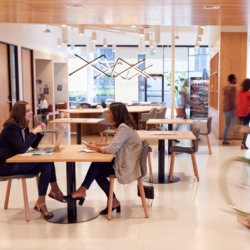To provide the best experiences, we use technologies like cookies to store and/or access device information. Consenting to these technologies will allow us to process data such as browsing behaviour or unique IDs on this site. Not consenting or withdrawing consent, may adversely affect certain features and functions.
The technical storage or access is strictly necessary for the legitimate purpose of enabling the use of a specific service explicitly requested by the subscriber or user, or for the sole purpose of carrying out the transmission of a communication over an electronic communications network.
The technical storage or access is necessary for the legitimate purpose of storing preferences that are not requested by the subscriber or user.
The technical storage or access that is used exclusively for statistical purposes.
The technical storage or access that is used exclusively for anonymous statistical purposes. Without a subpoena, voluntary compliance on the part of your Internet Service Provider, or additional records from a third party, information stored or retrieved for this purpose alone cannot usually be used to identify you.
The technical storage or access is required to create user profiles to send advertising, or to track the user on a website or across several websites for similar marketing purposes.
 New research suggests that almost half (44 percent) of working carers in England and Wales, equivalent to around 1.6 million people, are struggling to cope with the pressures of balancing their work and caring responsibilities – and that a quarter (24 percent) have considered giving up their job entirely. These are the findings in a newly published report, titled “Supporting working carers: How employers and employees can benefit”, from the CIPD and The University of Sheffield. (more…)
New research suggests that almost half (44 percent) of working carers in England and Wales, equivalent to around 1.6 million people, are struggling to cope with the pressures of balancing their work and caring responsibilities – and that a quarter (24 percent) have considered giving up their job entirely. These are the findings in a newly published report, titled “Supporting working carers: How employers and employees can benefit”, from the CIPD and The University of Sheffield. (more…)





 Organisations that favour agile working and make strategic investments in human capital during the coronavirus crisis will be best positioned to gain market share and overtake competitors, according to a new Talent Trends report released by Randstad Sourceright.
Organisations that favour agile working and make strategic investments in human capital during the coronavirus crisis will be best positioned to gain market share and overtake competitors, according to a new Talent Trends report released by Randstad Sourceright. 








 Productivity has increased due to the current lockdown situation, according to around half of UK workers. The majority (56 percent) of workers who don’t usually work from home feel more productive than in the office. Despite this, 50 percent of those currently working from home are looking forward to their workplace reopening, although 70 percent hope their employer lets them work from home more often in future. Nearly half (45 percent) of workers would therefore welcome a
Productivity has increased due to the current lockdown situation, according to around half of UK workers. The majority (56 percent) of workers who don’t usually work from home feel more productive than in the office. Despite this, 50 percent of those currently working from home are looking forward to their workplace reopening, although 70 percent hope their employer lets them work from home more often in future. Nearly half (45 percent) of workers would therefore welcome a 
 Kincentric
Kincentric













June 19, 2020
We are in danger of reanimating some bad ideas about work
by Mark Eltringham • Comment, Working culture